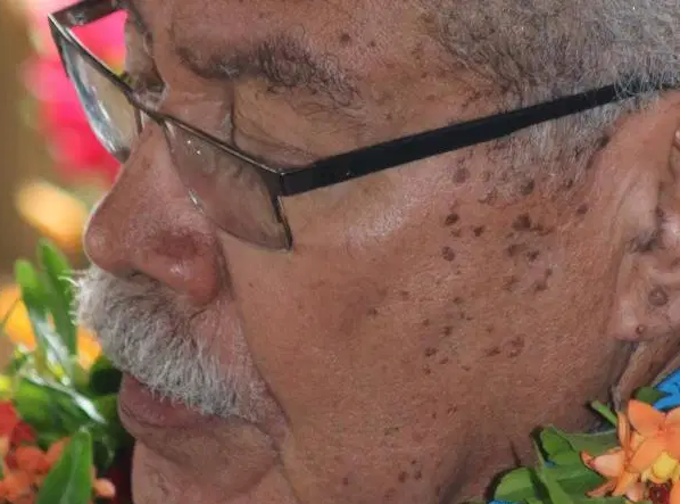By Anish Chand in Suva
Political leaders are known to beat around the bush when it comes to answering serious topics and when faced with a hard-nosed journalist who wants the story he or she is chasing.
With the late Laisenia Qarase – who died last week – he never lied and spoke his mind openly on many contentious issues that his government was dealing with.
In my days at Fiji Television, I found the late Prime Minister ready to take on the media. We did many door-stops with him … as he arrived at his office, left his office or a function and at Parliament.
READ MORE: Fiji government resources mobilised for Qarase’s funeral
If he was happy to talk about an issue, he would stop and answer all questions. If he wasn’t okay with the first question that was fired, he would continue walking. If he didn’t have an answer, he would say so, but he never lied.
Then he had his favorite reporters who he knew would ask serious questions and present a balanced, fair and accurate report at 6pm.
During breaks in Parliament, when he stood around the large tanoa with his ministers, and saw a journalist he was well versed with walking towards the grog corner, he would straighten his jacket and eye-glasses and get ready to roll.
I don’t think he ever thought the media “was to get him” or “put him on a spot”
Understood the media
He understood very well what the media’s role was; something he might have picked up during his time as chairman of the Fiji Television Limited board, or from the experienced media advisors he had in Matt Wilson, and Shailendra Raju.
An Auditor-General report had come out that criticised page after page government spending and it was major news. The late Prime Minister was out of town and we needed balance from his office.
Soon I received a call that I was to go up to the fourth floor and all questions would be answered by the Permanent Secretary, Jioji Kotobalavu.
On a Sunday, an important news required the Prime Minister’s comments and through a call to one of his staff to check on his availability, a call came back, asking me to come to the late PM’s house and he gave an interview by the entrance of his house at Richards Road.
On an official trip to India, I was the only Fiji media representative with his entourage. Arriving in New Delhi, I was assigned car number 13, right at the back of the motorcade that would make it difficult for me to get out and join the PM for the best pictures.
After I made my case to his personal secretary, who took the matter up to the late PM, I was assigned car number 6, three cars behind car number 3 that carried the PM.
An Indian Special Forces officer queried why my car was being changed, and he was told I was a major and needed to be close to the PM to capture all his engagements. For the rest of the trip, I was addressed as major, together with two other occupants in car number 6, Sakiasi Ditoka and Onisivoro Vuniyaro.
Kava session
In Calcutta, after a long day’s engagement as a number of us sat inside a room drinking grog, the phone rang and the Police Protection Officer John Pillay answered and said, “Sir, Sir” twice. He put down the phone and announced the Prime Minister was on his way to join us.
Qarase had walked about 30 meters from his room to ours, flanked by his Indian Security Force officers. They stood outside and must have wondered what all the laughter was about inside the room well past midnight, the late Ratu George Cokabau was at his best in entertaining us.
On the tour of the Taj Mahal, this core-group of grog-swiping majors carried two bottles filled with grog and we achieved our aim of drinking kava on the top of the majestic wonder as we heard the tour guide talk about the Yamuna river that ran alongside the Taj Mahal.
As we did one taki, we heard Minister George Shiu Raj seek a blessing by saying, “Jai Yamuna Maiya” in an elevated voice, and his hands clasped above his head.
A few days before the 2006 general election, I had requested to follow and interview Laisenia Qarase and Mrs Qarase as they left home to cast their votes on polling day. That wish was also granted as I sat in their vehicle, interviewing both, on the way to the polling station.
“Fiji needs him,” had said Mrs Qarase.
Nine months later with the December 2006 military coup, all that changed.
Anish Chand, a senior Fiji Times journalist, shared his reflections with his Facebook network. His commentary is republished here through the Pacific Media Centre with the author’s permission.













































